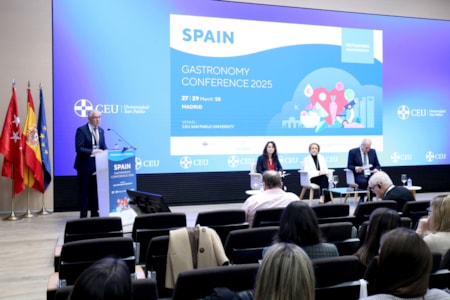
More than 30 international speakers, 200 participants and 100 abstracts presented: these are just some of the figures that marked the Spain Gastronomy Conference 2025 held in Madrid. Organised by the Real Academia de Gastronomía and the CEU Institute for Food and Society Institute of the Universidad CEU San Pablo, with the support of the International Academy of Gastronomy, the event focused on the concept of ‘Reframing Gastronomy’, an innovative approach that seeks to redefine the way in which gastronomy is conceived, produced and experienced.
From this perspective, researchers, academics, experts from various disciplines and chefs spent three days exploring how gastronomy can evolve along three key axes: innovation in techniques and products, sustainability as a fundamental pillar and the transformation of the gastronomic experience.
‘We are living a moment of change in gastronomy. Reframing invites us to rethink not only how we cook, but also how we relate to food, culture and sustainability,’ said Luis Suárez de Lezo, President of the Royal Academy of Gastronomy.
Keys to gastronomic reframing
Modern gastronomy requires a multidisciplinary character, and both science and technology are a guarantee for this holistic vision, which was the central axis and distinguishing feature of this international conference. Innovation was one of the main themes of the conference, with discussions about the use of new technologies, alternative ingredients and new culinary techniques that are revolutionising today's cuisine. From the use of artificial intelligence to the development of alternative proteins, the aim is to push the boundaries of gastronomic creativity. ‘Technology allows us to discover new ways of cooking and presenting food,’ said Javier Aranceta, of the Spanish Society of Community Nutrition (SENC) and an expert in culinary innovation.
Another key theme was sustainability and responsibility in gastronomy. Strategies were presented to minimise food waste, promote circularity in the kitchen and encourage responsible production. The link between local produce and global cuisine was another key point of discussion. ‘Restaurants and producers have a responsibility to adopt more sustainable practices to ensure the future of our food,’ said food sustainability specialist Susanne Højlund from the University of Aarhus, Denmark. The importance of the Mediterranean diet as a culturally, environmentally and socially sustainable model was also highlighted.
The conference also focused on the need to educate and disseminate the value of gastronomy, not only from a culinary perspective, but also from a scientific one. Joxe Mari Aizega Zubillaga, from the Basque Culinary Center, stressed the importance of creating open ecosystems of innovation, research and training to better connect cuisine with industry, diners and agri-food production.
Renowned chefs such as Paco Roncero, Begoña Rodrigo and Rodrigo de la Calle also took part in these mixed debates, where cuisine, research and innovation shared the stage. The chef from El Invernadero (Madrid) called for the Mediterranean diet and ‘the immediate promotion of a food subject in schools as a fundamental tool for protection and health’.
Begoña Rodrigo echoed this call, sharing with the audience her research into vinegar and how working with acidity has allowed her to create lighter menus. ‘The beauty of gastronomy is to explore, discover, recover and add value. "Gastronomic restaurants have a responsibility towards producers", said the chef from La Salita (Valencia).
The transformation of the culinary experience also featured prominently in the debate. Reframing gastronomy also means rethinking the dining experience, exploring the relationship between food and emotion, sensory immersion and the impact of digitalisation on restaurants. ‘Eating is no longer just about eating, it is a multi-sensory experience that we must continue to explore,’ said French psychologist Charles Spence, from the University of Oxford, UK, who studies how the senses influence the culinary experience.
The programme included keynote speeches, roundtable discussions and interactive workshops to encourage the exchange of knowledge and experience among participants. Topics discussed included the importance of gastronomy in public health, the role of education in creating healthy eating habits and the need for clear regulations around ultra-processed foods and nutritional information. ‘Food heritage is much more than a food guide; it is an expression of our history and culture’, affirmed Emilio Martínez de Victoria Muñoz.
According to Gregorio Varela-Moreiras, Professor of Nutrition and Bromatology at Universidad CEU San Pablo and Director of the CEU Institute for Food and Society, ‘this meeting is a unique opportunity to analyse the future of food from a global perspective, integrating science, technology and tradition’.
With presentations from leading figures in international gastronomy and the presence of experts in fields such as technology, sustainability and neuroscience, this international conference, which will be held next in Hong Kong in 2026, has reaffirmed its commitment to a more innovative, sustainable and accessible gastronomy, laying the foundations for a future where cuisine, science and education go hand in hand.